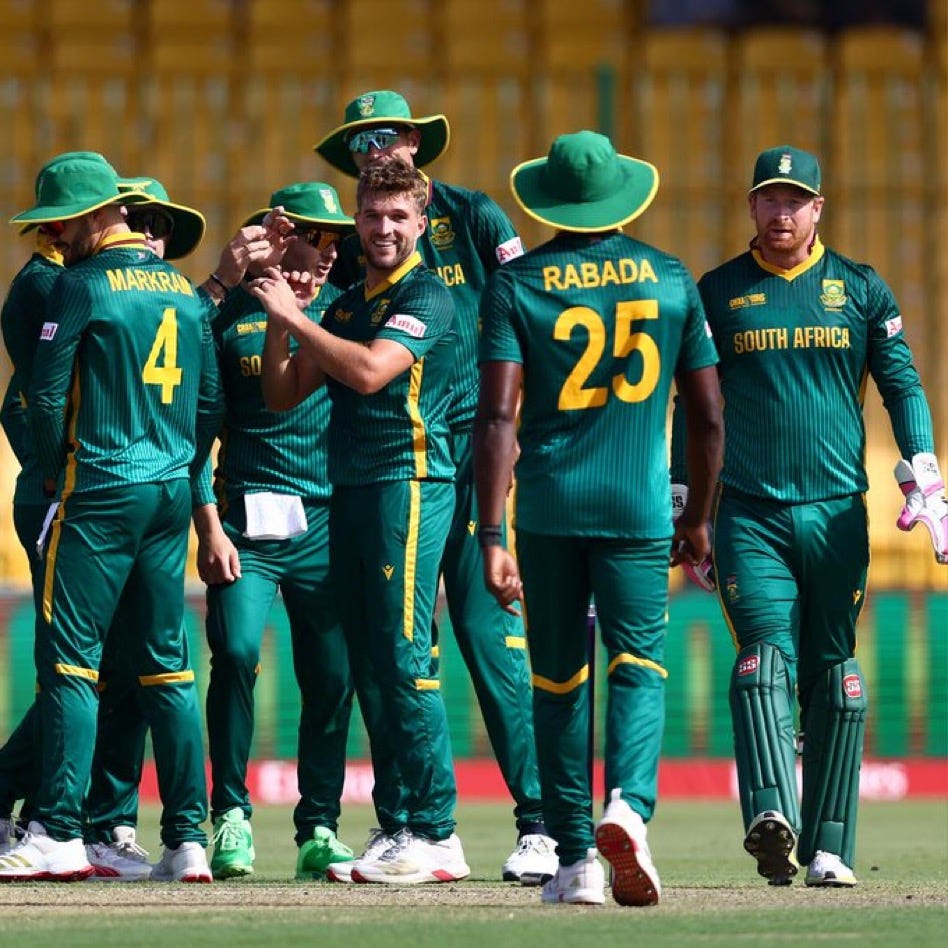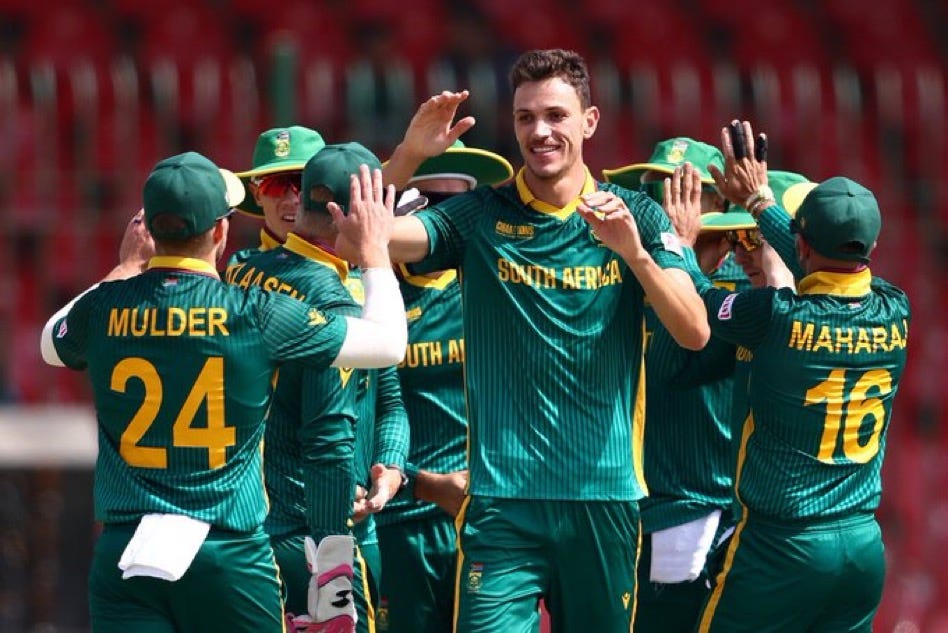It might have been a crazy, expats Bachelors Party, a stag-do starting in Karachi before moving to Dubai for a steak and 18-holes of floodlit golf – maybe a cheeky beer or two – before returning to Lahore, all in the space of 24-hours.
Heinrich Klaasen said it was “…nice to be able to get out and stretch the legs” but did admit that it was a “a bit tough on the bodies” before sympathising with the New Zealand team who were required to fly to Lahore just six hours after their final group match against India. “It was probably harder for them, to be honest,” said Klaasen.
The Proteas left their hotel in Karachi at 9:30am on Sunday after routing England by seven-wickets on Saturday and boarded a commercial Emirates flight at 11:30am before finally checking into their Dubai Hotel around 3:00pm. About six hours later it was obvious that New Zealand would lose to India requiring both teams to return to Lahore to play each other in the second semi-final.
On Monday morning they left their Dubai Hotel at 7:30am, boarded a chartered flight at 10:30am and reached their Lahore hotel by 3:00pm, again. A completely pointless trip? No. Half a dozen of the players enjoyed that round of floodlit golf. Klaasen had that much-needed steak. Should India beat Australia in Dubai and South Africa prevail against the Black Caps on Wednesday, they will return to Dubai for Sunday’s final.
Just three months before it started, the Board of Control for Cricket in India – citing an unseen or published government directive - told the ICC that they would not be playing in Pakistan. As far as global sports events are concerned, it was far from unprecedented. Bans, boycotts and withdrawals happen all the time but the Olympics and World Cups carry on without them.
But not cricket. Instead of replacing India with the next highest ranked team, Sri Lanka, the game contorted itself into a twisted compromise allowing the Indian team to play all of their matches in Dubai. And the game got what it deserved with an unlikely quirk of the fixtures which saw the semi-finals, and their venues, not decided until the final group match.
It meant that both the Australian and South African teams had to fly to Dubai over the weekend in order to be ‘in place’ and able to have a practise session at the venue before the first semi-final. The other would have to return almost immediately to Pakistan for the second semi-final in Lahore on Wednesday.
“We were aware that it might happen, that a team could fly to Dubai and come straight back, and unfortunately it was us,” said a shoulder-shrugging Klaasen.
There has been an abundance of outrage and indignation at the absurdity of the situation and the consequent lack of the tournament’s credibility as a ‘fair contest’ with the Indian team settled in one hotel, playing at one venue and not required to do any travelling. But the most striking – and amusing - aspect is that none of the opprobrium, none at all, has come from the South Africans.
The squad have romped to the ‘Phlegmatism of the Year’ award. If shoulder-shrugging was a sport like cricket, they would already have won this tournament and could be installed as early, strong favourites for every occasion in the future when the playing conditions and itineraries at ICC tournaments are jiggled to favour India.
The closest came from Rassie van der Dussen who said: “You don’t need to be a brain surgeon to see that playing all your games at one venue, practising at that venue and staying in the same hotel without the hassle of travelling is an advantage,” before adding, with a twinkle in his eye, “but now it’s up to them to make that advantage count.”
It was whimsy at its best, a laconic recognition of the cricket world’s status quo in which the BCCI call all of the shots. Or at least, all of them which mean anything or matter. Van der Dussen is a thoughtful senior, disinclined to deliver platitudes or cliches. He is well travelled in life. His response was purely factual without judgement with a delicious ‘tease’ to sign off.
Marco Jansen was closer to flippant about the arrangements. “I don’t know,” he said with his disarming grin and yet another shoulder shrug, “it’s only an hour-and-a-half flight so it’s like a domestic journey at home. I haven’t played golf in a while, though…” The flight was, in fact, closer to two and a half hours but at least he was able to scratch his golfing itch.
Coach Rob Walter summed up the squad’s mood and approach when it was his turn to answer the question: “It is what it is and I don’t think it’s the best use of our emotional energy commenting about a situation which we can’t change…and isn’t going to change. We’re much better off concentrating on playing the best cricket we can, wherever that may be.”
There is something so delightfully South African about this pragmatic acceptance of reality, a determination to make the best of things in a world which is inherently unfair. It’s only sport, after all. And there is the IPL and future employment to consider. Absolutely no point in poking the bear while so many others are doing that already. Rather allow the bear to choose the music and then try to outdance it.







Lovely piece, however, it is surely time that the ICC had some awareness and meaningful response to the climate emergency.
A great summary of a faintly ridiculous situation. Despite the travel/steak/golf (or maybe because of the latter two) I think SA have a great shot at winning this. If the batsmen fire they should have too much for the Kiwis tomorrow. And then the extra bounce from Jansen might well trouble India in the final, provided the pitch isn’t totally dead.
Hopefully next time though, the other teams have the balls to refuse arrangements which blatantly favour India. I’m not holding my breath.